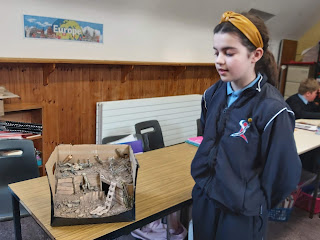The Land War- Notes from History Classes September 2019
Our Class Notes- M Goggin
The Land War
After the famine (1845-1849) LAND OWNERSHIP issues became central to political life in Ireland.
The way in which Irish land was
1. Owned
2. Rented out
3. Inherited
had contributed to the appalling effects of the famine.
In the late 1870s and early 1880s more bad harvests occurred.
This lead to another threat of famine and landlords responded by evicting families.
In response a new movement occurred- the Irish National Land League
- Fight for the rights of small tenant farmers
3 Fs
a. Fair Rent
b. Fixity of Tenure
c. Freedom of Sale
a. Rent is in line with market price for land NOT the inflated price set by the landlord.
b. Rent agreement to state how long tenants could stay (gave security).
c. Tenants had rights when the land was sold
Michael Davitt
Founder of the National Land League
Family had been evicted in the 1840s when he was 5 years old.
Family was forced to move to England.
Working conditions were dangerous at the time.
Davitt was working in a factory at 11 years of age.
He lost his arm and became unemployable.
Educated himself
Saw the British as being responsible for the Irish problems.
After being released from Dartmoor Prison (trafficking arms- Fenian activity) he turned his attention to landlords.
Boycotting Unscrupulous Landlords
To achieve their aims, the Land League attacked the landlords who treated their tenants badly.
- Physical Attacks
- Lord Leitrim was MURDERED
GREATEST tool of the Land League, and found its place in the English language is the Boycott.
Captain Charles Boycott was one of the first targets after whom the strategy was made.
Basic idea of Boycotting
- No business or socialising with the landlord
- Farmers refuse to work for them
- Remainder of the community ostracise them.
Not only were landlords boycotted. Any Irish people who took on the land of the evicted people were punished.
The President of the Land League told the crowd these people should be
1. Ignored at shop counters
2. Ignored at fairs/market place
3. Ignored on the roadside
4. Ignored even at the house of worship.
These tactics were successful however rural Ireland was difficult to work in as a result.
Lovely Mr Gladstone and the Land Act
British Prime Minister William Gladstone decided to address the situation. Rather than squash the protests, he addressed the issues.
The Land Act gave the Irish tenants what they had wanted- Fair Rent, Fixity of Tenure and Free sale of tenants interests.
Parnell Rules the Roost
Homerule- What is it?
Ireland wanted their own parliament, but understood the value- economic and political- of staying in the British Empire.
Home Rulers wanted a parliament in Dublin for which the Irish people would elect the MPs and that would have power over all aspects of running Ireland.
Parnell was born a Protestant to a large landowning family in Wicklow- Avondale House.
His family was wealthy and many of his male relatives, including his father, were MPs.
He was a disruptive little boy and so his sisters christened him “Butthead Parnell.”
|
When Parnell was elected, the Irish Home Rule Party was led by Isaac Butt. Butt played by the rules in Westminster.
Parnell believed that Home rulers were unlikely to get what they wanted. Liberal and Conservative parties didn’t seem interested in Ireland.
Parnell decided to make life difficult for everyone else. He decided to disrupt the parliamentary system. He made long speeches and made debates last for hours (one lasted 26 hours). He managed to bring everything to a grinding halt.
Obstructionism made Parnell popular in his party, widely acclaimed in Ireland and was a way to intensely irritate the government.
In 1879 Isaac Butt died and a year later was replaced by Charles Stewart Parnell.
Parnell’s Allies: Radicals and Politicians
The Home Rule Party, The Land League and The Fenians
What did they all want?
Home Rulers: Wanted a separate parliament for Ireland, based in Dublin, as well as parliamentary representation at Westminster.
Land League: Fight for the rights of small tenant farmers- end abusive relationships between them.
The Fenians: Create an Irish Republic, a country free of British rule. They believed in violence.




Comments
Post a Comment